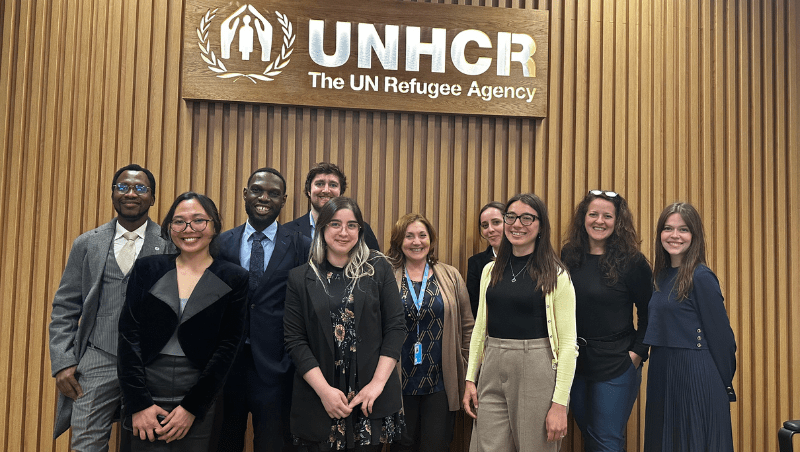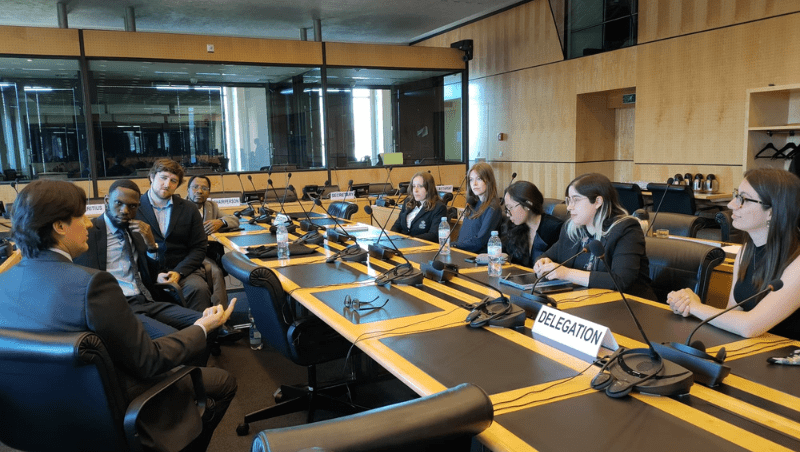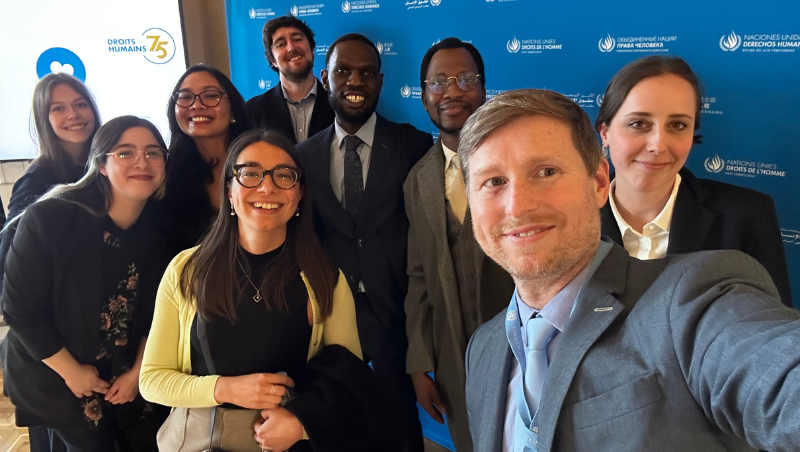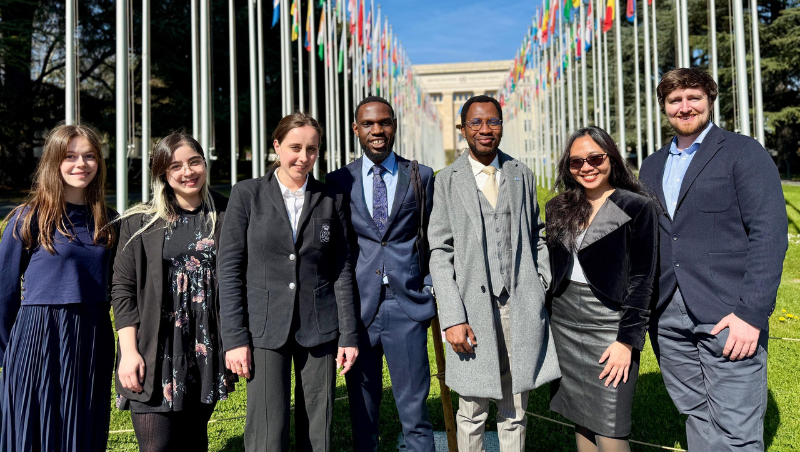Arbitrary Detention Redress Unit visits Geneva

Arbitrary Detention Redress Unit (ADRU) student-members Alfiana Qisthi, Camila Araneda Jofré, Juliette Richard, Louise Kazek, Lukman Audu, Misheck Jere and Oliver Goldsmith undertook a visit to Geneva from 8-9 April 2025, The visit was designed to provide contextual understanding of the United Nations human rights work, opportunities to meet with professionals and experts on human rights and to enable the student-members to present their thematic research on human rights to United Nations experts.
The ADRU is a project of the Human Rights Centre Clinic, which funded this trip. The students were under the supervision of Dr. Matthew Gillett and accompanied by Dr Sabina Garahan, the Director of the Human Rights Centre Clinic.
The visit coincided with the 102nd session of the UN Working Group on Arbitrary Detention, which is a Special Procedure of the Human Rights Council. As a result, the Essex students had the opportunity to meet with three of members of the Working Group: Dr. Ganna Yudkivska, Dr. Mumba Malila, and Dr. Matthew Gillett (also a Chair Rapporteur) at the Palais de Wilson.
At the meeting, the students presented key findings from their thematic research on issues relevant to cases of arbitrary deprivation of liberty and the Working Group’s mandate, including:
- War on Drugs and Arbitrary Detention: Indonesia and the Philippines
- Alternatives to The Right to Consular Assistance for Foreign Detainees, · Artificial Intelligence: Predictive policing and Arbitrary Detention
- Persons with Disabilities and Arbitrary Detention
- Children in Social Care Institutions and Arbitrary Detention
- Children Refugees in Arbitrary Detention
The students’ presentations were followed by an engaging discussion with the Working Group’s members who shared their comments on these emerging issues, their own experiences working on human rights issues, and manifested their interest in the students’ research. The engaging and informative exchange allowed the students to ask and gain direct insights from these independent experts who have been dealing with these issues and identifying effective solutions worldwide.
Toward the end of the meeting, the members of the UN Working Group commended the efforts of the students, and were very impressed by their thematic research.

While in Geneva, the students also attended a meeting at the Headquarters of UNHCR with two UNHCR officials, to share insight into the work of the ADRU and to learn about UNHCR detention guidelines and procedures.
During the meeting, the students shared insights from their thematic research which aligned with the work of the UNHCR, including the detention of child refugees. The UNHCR team then gave a presentation on UNHCR detention guidelines and the most pressing issues for UNHCR in relation to the detention of refugees globally. They highlighted the importance of the legislation in relation to refugees, especially the Refugee Convention and the different alternatives to detention which have been developed internationally. The UNHCR officials shared information about UNHCR’s latest advocacy brief on the detention of asylum seekers and refugees; Unlocking Rights: Towards Ending Immigration Detention for Asylum-Seekers and Refugees, which includes a category on children’s detention. The special emphasis on child refugees was very useful since it has been included in the jurisprudence of the Working Group on Arbitrary Detention. It was also very interesting to understand the challenges to immigration detention and what types of legal measures are available to prohibit violations of human rights.
The students noted that the advocacy brief aligns closely with the mandate of the Working Group on Arbitrary Detention, and that previous opinions of the Working Group are referenced in the advocacy brief. The presentation was very insightful, and the students learned a lot from it.

Students also had the opportunity of meeting with the UN Committee against Torture, specifically Professor Jorge Contesse Singh. As they sat down with the esteemed expert, the students gained invaluable insights into the Committee's critical work. Professor Contesse shed light on the Committee's mandate, expertly guiding the students through the intricacies of reporting guidelines and the delicate balance of diplomatic relationships with NGOs, civil society organizations, national human rights institutions, governments, and other UN agencies. With candid examples, he illustrated the Committee's tireless efforts to tackle torture cases across the globe, showcasing the complexities and challenges involved in protecting human rights.
The meeting culminated in a dynamic Q&A session, where students probed deeper into various aspects of the Committee's work. Professor Contesse's thoughtful responses, peppered with relevant examples, provided the students with a nuanced understanding of the Committee's role in upholding human rights and addressing the cases of torture.

After the engaging activities and meetings of the day, the students participated in a guided tour of Geneva to different parts of the city and had dinner.

The following day, the students had a valuable opportunity to visit the Independent Investigation Mechanism for Myanmar (IIMM). During their meeting, they acquired insights into the complex field of human rights investigations, with a special focus on the serious crimes committed in Myanmar since 2011.
The session allowed for an enriching dialogue on how the IIMM actively contributes to criminal investigations at international and national court levels and their perspectives on the methodologies employed to collect and preserve crucial evidence, highlighting the challenges inherent in this sensitive and fundamental process.
From the perspective of the importance of investigating serious human rights violations, the students better understood the IIMM's vital role in seeking accountability and justice for victims in Myanmar. The visit provided an in-depth and practical insights into the essential work being done to address impunity and promote respect for human rights globally.
After the meeting with the IIMM, the students had the privilege of meeting with the Secretariat of the UN Working Group on Arbitrary Detention. This was an opportunity to understand the crucial work of the Secretariat that takes place behind the scenes in support of the Working Group’s mandate. Meeting with the four dedicated members of the Secretariat, each responsible for handling communications related to a specific region, allowed the students to learn how they process submissions received, engage with the sources to gather all necessary information, and liaise with governments to solicit official responses to the allegations. They also share how they meticulously work on cases, in order to sufficiently prepare communications for the Working Group to examine and deliberate on during its formal sessions.
Beyond the technical aspects, the students were especially grateful for the opportunity to hear about each Secretariat members’ professional journey. Their experiences and the advice to students were invaluable and inspiring.
Overall, the visit was an academic and professional highlight for students, offering a chance to connect with human rights experts and enjoy stimulating discussions. Beyond the professional insights, it was also an opportunity to savour the beauty of Lake Geneva and bond with peers over cheese fondue. As the ADRU project looks to the future, it hopes to inspire a new generation of student-members to continue this vital work, fostering growth and development.

Background
The ADRU was established as a stand-alone project of the Human Rights Centre Clinic in the 2022-2023 academic year. Its inaugural supervisor was Dr. Matthew Gillett, a Senior Lecturer at the University of Essex Law School and a United Nations Special Mandate holder as the expert for Western Europe and Other States on the Working Group on Arbitrary Detention (WGAD).
During the year, the student-members learn about and contribute to:
• Individual arbitrary detention cases coming from a range of regions and falling under the categories of arbitrary detention as adopted by the WGAD. These categories cover cases involving issues ranging from detention without lawful basis, to detention as a reprisal for the exercise of the freedoms of assembly, expression and association, to detention in gross breaches of fair trial guarantees, to immigration-based detention, to discriminatory detention practices on the basis of religion, ethnicity, and other protected statuses.
• Thematic research on topics related to arbitrary detention, such as the War on Drugs, to Artificial Intelligence-aided Surveillance and Predictive Policing, to the Right to Consular Assistance, to the Rights of Persons with Disabilities, to the Rights of Children in Social Care Homes, and the Rights of Refugees including Children.
They also enjoy guest lectures from experts on human-rights related issues.